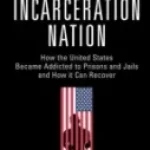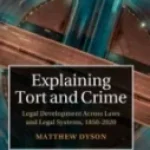Just Policing
 Author: Jake Monaghan
Author: Jake Monaghan
Publisher: Oxford University Press, 2023. 248 pages.
Reviewer: David Wolitz | September 2023
Jake Monaghan’s new book, Just Policing, sets out to answer a big question: “What does just policing look like in our world, with its actual injustices?”. [1] While he acknowledges the abolitionist perspective, Monaghan begins the book with an explanation of why many of the basic functions of police work—including violence prevention and social coordination—constitute legitimate state responses to recurring problems of collective living. Because police exist to mitigate real problems of public order, Monaghan argues, some state institution or set of institutions will and ought to perform policing functions. But Monaghan also recognizes that police forces, or any alternative institutions taking on police functions, will inevitably beget severe problems of their own, be it over-enforcement, racial discrimination, and/or systemic violations of civil liberties. Monaghan thus describes his methodology as “doubly non-ideal,” recognizing both the problems of social life that lead states to create police forces and the problems that police forces themselves create and exacerbate. [2]
Given the reality of recurring injustice both in society writ large and in policing institutions, how can police tack toward more just policing? Monaghan’s basic answer is that police “officers and administrators should avoid high legitimacy-risk policing.” [3] In other words, police should concentrate on those actions that are least likely to undermine their legitimacy. But what is it that makes police actions more or less legitimate? Here, Monaghan provides a variety of criteria for assessing police legitimacy and, in doing so, criticizes a strictly proceduralist view which he calls Legalism. The discussion of Legalism is one of the most interesting sections of the book (at least to this law professor), and I will focus on it below.
On the Legalist account, police legitimacy derives axiomatically from positive law, most fundamentally from the criminal code that defines crimes and thus implicitly authorizes the executive branch to enforce the law via police and prosecutors. The criminal code is itself legitimate because it is the enacted will of the legislature, whose own authority ultimately rests on its democratic authorization. The Legalist story thus anchors police legitimacy in the people, or demos, who authorize a legislature to pass criminal laws and create a force tasked with enforcing those laws—namely, the police. This is a theory of democratic legitimacy and, perforce, legislative supremacy. Police, on this account, are the “passive conduits through which legislative decisionmaking flows.” [4]
Note that the Legalist theory of police legitimacy does not rely on the substantive justice of police action or even on explicit public support for the policies and laws that the police enforce. Police legitimacy, on the Legalist account, flows only from a formal adherence to duly enacted law.
The Legalist position thus views police discretion as problematic—a necessary evil at best, but something difficult to reconcile with strict fealty to the law. Police discretion, on the Legalistic view, is regrettable because when police officials act out of their own discretion, they let go of the chain that tethered them to their font of legitimacy—namely, the law. They are out on their own, without a legal leg to stand on and without democratic legitimacy.
Monaghan argues that the Legalist view is misguided for a number of reasons. First, he contends that the Legalist view inevitably promotes over-enforcement of criminal law because, under Legalism, the duty of police is to impartially enforce the code. Monaghan notes that blind enforcement of all reported or observed violations of the criminal code is not remotely practical in the real world given the volume of law-breaking and the resource constraints of police; it would also be a substantively unjust policy even if somehow achievable. Setting enforcement priorities and using discretion not to enforce every law at all times is an inevitable feature of policing. Legalism, Monaghan argues, fails to account for this necessary discretion and thus fails to provide any useful guidance for how police should exercise that discretion.
Second, Monaghan notes that the legislatures we have do a terrible job creating criminal law. The actual criminal law is a mishmash of accumulated statutes and revisions, plus common law holdovers, and American criminal codes are full of laws that no longer command popular support and are counter-productive or substantively unjust. Because of flaws in the law-making process itself, flaws that we know militate toward an unjustly punitive system, Monaghan argues that the Legalist reliance on the legislative process is misplaced.
Third, Monaghan argues that legal indeterminacy—the susceptibility of legal language to multiple interpretations—renders Legalism implausible. Just as judges struggle to interpret criminal laws in the context of adjudication, so to do police struggle to interpret criminal laws in the context of enforcement. There is no single clear answer to ‘what is the law?’; therefore, it is impossible to say that a police officer could or should merely enforce the law. Enforcement implies interpretation, meaning that police inevitably have interpretive discretion in addition to their enforcement discretion.
The upshot is that the Legalist, always worried about formal adherence to pre-existing law, is constantly denying or decrying the reality and significance of police discretion. For Monaghan, this is a grave mistake because it prevents us from thinking clearly about how police should use their discretion. Rather than trying to downplay police discretion, as Legalism does, Monaghan argues that we should be searching for a positive, strategic, and just theory of police action, one that does not rely on strict adherence to extant law as the sole foundation of police legitimacy. [5] The bulk of Monaghan’s book is an attempt to begin describing such a positive theory.
In particular, Monaghan argues that police actions are at their most legitimate and just when: (a) the burden of police actions are proportional to the social harms they are meant to mitigate; (b) the police actions are reactive to citizen complaints or obvious harms, rather than pro-active attempts to intervene in civilian life; (c) the police actions come with strong popular authorization; and (d) the burdens of those police actions do not fall disproportionately on vulnerable segments of the population. [6] These four criteria provide an extremely useful framework for assessing police activity, and scholars will no doubt follow Monaghan and build upon these criteria in their assessment of police activity in the future.
Monaghan’s critique of Legalism is powerful, and he is correct to name and describe Legalism as an influential tendency in discussions about legitimate policing. Law professors like me are particularly susceptible to overly proceduralist accounts of justice in general and to Legalism in particular. But I think there is something to say in defense of Legalism, or at least a more nuanced form of Legalism.
First, Monaghan is surely right that our actually-existing legislatures do a poor job of making criminal law. Every jurisdiction would benefit from a substantial rethinking and pruning of its criminal code. But criticism of legislative failures in criminal law drafting is important precisely because the criminal code legitimates police law enforcement. Of course, having a good code of substantive criminal law will not on its own produce good or just policing, but bad criminal law makes good policing impossible from the start.
Second, Monaghan’s suggestion that Legalism implies a policy of compulsory enforcement is understandable at the level of theory, but in practice, this is not the case. American courts accept as a matter of settled law that police and prosecutors may always decline to arrest or prosecute suspects. There is, of course, a tension between selective non-enforcement and impartial enforcement of the law, but the fact that courts zealously guard police discretion in the context of non-enforcement suggests that Legalism is in fact compatible with recognizing huge amounts of police discretion. Perhaps Monaghan’s criticism would be more apt in a criminal legal system that claims full enforcement—e.g., the German theory of compulsory prosecution—but the American system safeguards police and prosecutorial discretion quite firmly.
More fundamentally, one could distinguish between a Legalism that is naïve and formalistic and a Legalism that is cognizant of and comfortable with the discretion that inevitably exists within any legal system. Legal Process Theory of the mid-twentieth century represented this second, more sophisticated form of Legalism, and it is no coincidence that one of the great stars of Legal Process Theory, Herbert Wechsler, spearheaded the drafting of the Model Penal Code. Wechsler and other mid-century criminal law reformers were comfortable with judicial discretion in adjudication, and they were also comfortable with police discretion in criminal law enforcement. The Model Penal Code’s drafters took pains to allocate discretion among police, prosecutors, judges, and penal authorities. Wechsler well understood that the words of the Model Penal Code could not be enforced in an apolitical or impartial manner by police who did nothing but carry out its dictates. He respected policing as its own distinct profession and discipline and did not think of police as mere conduits of the criminal code. At the same time, Wechsler wanted the criminal code to clearly set the legal bounds of discretion for police and other actors in the criminal legal system. It is possible, therefore, to hold to Legalism while at the same time seeing an important role for police to develop policies and norms within the wide discretion granted to them by the law. Monaghan’s argument that just and legitimate policing is not reducible to following the law is sound; but one can assent to that proposition while insisting that just policing entails following the law—that is, acting within the bounds of legal discretion.
At the end of the day, it will take both formal changes in law and significant reforms in police practice to make everyday policing more just in the imperfect world in which we live. As a law professor more comfortable parsing statutory language than police tactics, I’m gratified that political philosophers like Monaghan are thinking hard about the actual work of police and how it could be reformed to produce more justice and less inequity.
David Wolitz is a Professor of Law at the University of the District of Columbia David A. Clarke School of Law.
[1] Jake Monaghan, Just Policing 1 (2023).
[2] Id. at 10.
[3] Id. at 101.
[4] Id. at 25.
[5] Id. at 49.
[6] Id. at 88.


